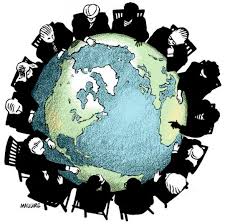hows that "elites" run~in Our World ..hows that work~in fer US ...folks huh! ...hows that shit go~in ??? we's got an asspipes "infestation" prob ..no :o

The corporate media would have us believe that the nation is in the midst of an economic recovery.
In the shadow of the approaching mid-term elections, the
president cites the number of jobs created and speaks optimistically
about America’s economic future. The future is indeed bright, but only
if you are among the wealthiest one percent of the population.
For instance, since the 2007 recession, the greatest crisis
of capitalism in 75 years, corporate profits have risen, CEO salaries
and bonuses are at record levels and the stock market is soaring. By
contrast, workers’ wages have stagnated for more than four decades,
benefits are either few or non-existent, and workers are encumbered with
debt that forces them to perform multiple jobs— if they can find
them—in order to survive.
Jobs that offer long-term security and a living wage are
scarce even for those with university degrees. Adjusted for inflation,
today’s workers are worse off than they were in the late 1960s.
Whose economic recovery is this?
According to economic forecaster Gerald Celente, 90 percent
of the jobs created in 2013 were part-time, most of them paying low
wages and providing no benefits. Student loan debt exceeds $1.1
trillion, a number that surpasses the combined credit card liability of
the nation.
These debts cannot be discharged through bankruptcy. The
big banks and corporations that finance political campaigns have no such
restrictions placed upon them.
Even the unemployment figures are deceiving. According to
the latest government data, unemployment is at 6.7 percent. In reality,
that number is probably closer to 17 or 18 percent, according to
economist Richard Wolff.
The government does not count people whose unemployment
benefits have expired or those who have given up looking for work. A
cashier working 10 hours a week at Food Lion is counted as fully
employed.
We have students, many of them burdened with immense debt,
entering a job market that makes it difficult for them to earn a decent
living. This is the economic minefield that workers across America must
navigate. A little truth might help them find their way and comprehend
why this is happening.
One of the many reasons we face such a bleak economic future is the implementation of Free Trade Agreements (FTAs).
In 1992, the North American Free Trade Agreement (NAFTA)
was implemented between the governments of the United States, Canada and
Mexico. NAFTA was fast-tracked through Congress by President H.W. Bush
and signed into law by President Clinton. NAFTA was promoted in the
commercial media as an engine for job creation in the United States, an
assertion that is contradicted by the facts. According to Wolff, more
than 700,000 jobs fled the country as the result of NAFTA, many of them
providing middle class incomes and benefits.
Those jobs are never coming back. It is not just the number
of jobs created that matter, it is the quality of those jobs that is a
predictor of economic success.
Furthermore, the mass movement of U.S. corporations to
Mexico wrecked the already struggling Mexican economy, particularly its
sustainable, locally-based businesses. The situation initiated a mass
migration of immigrant Mexican workers to the U.S. in search of
better-paying jobs than were available to them in the homeland.
Multinational corporations seeking a source of cheap labor and a climate
of deregulation are the primary benefactors. The quantifiable effect
that NAFTA has had on the U.S. workers is staggering job loss, reduced
wages and increasing economic disparity.
Now, with the backing of corporate lobbyists, yet another
FTA—the Trans-Pacific Partnership (TPP)—is being fast-tracked through
Congress. Both Democrats and Republicans are enthusiastically backing
the legislation.
The Electronic Frontier Foundation describes the process:
“The Trans-Pacific Partnership is a secretive, multi-national trade
agreement that threatens to extend restrictive intellectual property
(IP) laws across the globe and rewrite international rules on its
enforcement.” TTP is currently being negotiated between nine to 12
nations.
If enacted, TTP will permit privately-owned corporations to
have hegemony over the governments of sovereign nations. For instance,
if the state of West Virginia were to ban the use of genetically
modified soybeans, Monsanto Corporation could either overturn the
decision or extort billions of dollars in remuneration from their
projected loss of profits. FTAs belligerently put corporate profits
before the legitimate needs of the people and the welfare of the
biosphere.
The implications for students and working class people will be profoundly detrimental.
Hundreds of thousands of jobs will flee the country, wages will fall
yet again, autonomy will be lost, and the job market will resemble the
wreckage of the Hesperus. FTAs are the means by which the power elite
are turning the U.S. into a Third World economy.


No comments:
Post a Comment